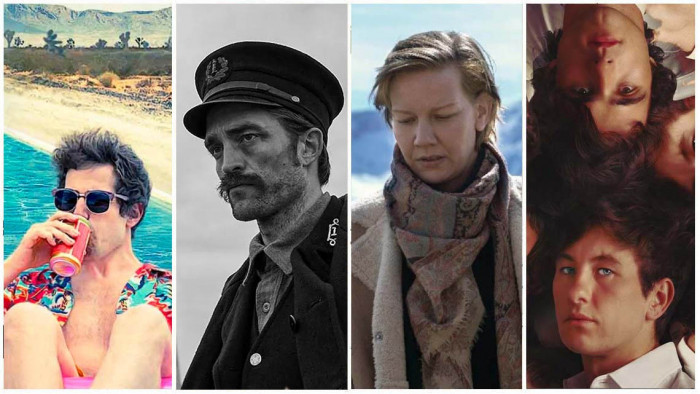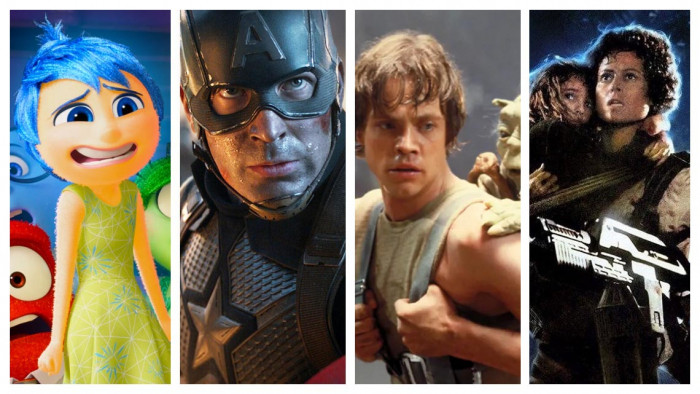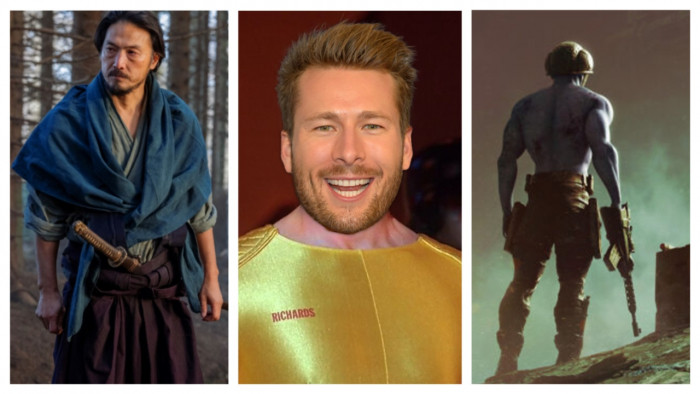What do you do when the most visible men in the world are arseholes?
ShortList editor Joe Mackertich assesses the challenges facing men in 2018


Masculinity, hey? What’s that all about? Friend, I will tell you what it’s all about.
It’s standing on a Tube platform, staring at an advert for a “tiredness prevention supplement” featuring a suited model who looks like an implausible cross between a silver-fox newsreader and a Chippendale (tagline: “Men can’t afford to get sleepy”). It’s a dozen film posters, all starring unsmiling brick-shithouse men holding weapons. It’s wincing at the sight of an acquaintance’s stag do on social media.
It’s opting out of five-a-side because you’re not in the mood for an apoplectic bloke from marketing screaming “WHERE ARE MY RUNS?” at you for 60 minutes. And it’s shrugging off the banterful homosexual slur that comes your way on WhatsApp when you say you can’t play.
It’s being told by your boss that he and you are going for a pint after work and not being able to say no because extracurricular drinking is essentially contractual in your line of work. It’s you and him knocking back continental lagers until he’s drunk enough to confide in you that he’s miserable, hates his life and has no close friends. It’s getting an email from him the next day (“Can’t believe some of the shit I was spouting”) where the subtext is: under no circumstances are you to tell anyone what I said last night.
It’s only talking to your friends at work about sex or money. It’s anger building up inside you with nowhere to go. It’s standing amid a hailstorm of distressingly contradictory marketing messages that suggest you should drink beer but also have a six-pack; work a high-paid job but also spend your evenings hanging out with your (equally successful) friends; constantly watch sport on enormous televisions but also raise a happy family.
It’s wanting to tilt your head back, eyes shut tight, to scream, “Being a man is shit.” But, crucially, not doing it. Because part of the problem is that men don’t verbalise their feelings. We internalise them, until it kills us.
RELATED: How to confront an abusive or inappropriate boss at work

The consequences of our emotional straitjackets are severe. Deaths relating to alcohol and drug addiction are higher among men. Our schools are full of boys who are dramatically underachieving compared to their female classmates. We die in car crashes with greater frequency and are more likely to be the victims of violent crime. And yes, famously, we commit suicide a lot (three times more than women in the UK, in fact). Despite all of this, only 36 per cent of mental health referrals are men. We need help but we won’t seek it out.
“Society is starting to realise that previous behaviours and attitudes considered ‘masculine’ haven’t served the male of the species well, nor the world around them,” says Fernando Desouches, an ads man who’s spent 20 years managing world-famous brands that target men. “Many men were raised being told not to express certain emotions as to do so was not considered masculine. With time, many of the young boys who initially consciously refrained from expressing emotions may have made that repression unconscious.”
What makes it worse is that the most visible men in the world are Arseholes And Proud Of It.
We’re forced to watch the likes of Donald Trump and Vladimir Putin strut about like a pair of cartoonishly dislikable CEOs, momentarily given the keys to the kingdom. Elsewhere, the professional disembowelment of Harvey Weinstein, resulting from a lifetime spent acting on his most sinister, harmful impulses, has left men feeling queasy. We’re forced to ask the question: is there a bit of Harvey in all of us (shudder)?
There can be no doubt that bad attitudes lead to bad choices. “Abuse of drugs and alcohol is often a result of these older attitudes, as are overwork, sex addiction and using sport to mask your emotions,” says Desouches. “If men are performing their lives rigidly to conform to an idea of success that is narrow and materialistic – despite how they feel – they will crack and have a breakdown. This is one of the reasons why depression and anxiety are growing.”
As the megalomaniacal editor of Britain’s biggest men’s magazine, I feel I have a part to play in addressing this. ShortList, your beloved paper pal, wants to help liquidise harmful male norms. The ManKind campaign (which starts, now) represents a year’s worth of stuff that shows men are capable of more than grunting, punning, drinking and suppressing multiple decades’ worth of undesirable emotion. It’s time to promote a different kind of masculinity.
“The most visible men in the world are arseholes and proud of it”
The men that float to the forefront of our collective cultural imagination have always conformed to archetypes. Whether we’re looking at fine art (the swaggery, macho Pablo Picasso or the insular, tortured Vincent Van Gogh), music (the acquisitive, imperious Dr Dre or the stoic and complicated Ludwig Van Beethoven) or action film stars (Minigun aficionado Sylvester Stallone or silent and violent Jean Reno), our heroes come in two distinct flavours. You’re either a shit-kicking, hard-kissing buccaneer or a brave-faced sufferer-sponge. These are our champions. Men are rarely celebrated for their sweetness, kindness or empathy.
Film is perhaps the area where these shortcomings were historically most obvious. “It’s odd now to see old movies where questionable behaviour such as boozing, sexism and emotionless killing passes without consequence,” says film critic James King.
“A new James Bond museum opening in Austria next month has announced it will completely ignore moments from Bond’s past that could be deemed offensive to a modern audience.”
It’s not limited to entertainment either. The turbo-brusque interview style of journalists such as John Humphrys and Jeremy Paxman feels out of step with public sentiment. The same is true of the musty, after-hours-clubhouse dynamic of our House of Commons. You don’t have to be an anarchist to take a dim view of a chuckling John Bercow on a big chair shushing female MPs while hundreds of blokes bellow their approval.
We’re taking cues from this very limited pool of people and that’s having a negative impact on our output. One area where this is apparent is at work.

“When groups of men work together they often start conforming to socially assumed ‘masculine’ ways of approaching problems,” says author Shane Snow, whose book Dream Teams looks at the science behind team dynamics. “For example, groups of male cops will often automatically resort to physical approaches to problem solving. They’ll immediately kick down a locked door, for example. On the other hand, a group of cops with even one woman in it will tend to think more critically about problem-solving and not just assume, ‘Hey, we all know we’re going to kick down the door, right?’”
This may also account for why so many of us are apparently addicted to staying late in the office, checking our emails at all hours of the day, working to the point of physical exhaustion and showing off about it all on social media. We’re being Work Macho. The longest hours, the biggest deals, the shortest lunch breaks.
“In general, any time we measure work in terms of time spent or effort exerted, I think we’re missing the mark,” says Snow. “Work should be about results. But somewhere between lingering, pilgrim-era ideals around hard work for work’s sake and current office culture [specifically the macho, late-nights-in-the-office culture] we forgot that.”
Society tells us that men, in emotional terms, are incapable of anything more than banter and essentially allergic to our own feelings. The demographical image of men that exists across Britain is repellent: an insecure doofus who needs to buy luxury goods to demonstrate value; someone who only spends time with his wife because he’ll earn “brownie points”, allowing him to stay out with his real friends at a later date. He’s bored by “chick flicks”, gets excited by sports cars, loves a blonde, wants bigger arms, is motivated by the urge to conquer and is utterly incapable of sincerity. He’s an arsehole and you should feel offended that it’s meant to be you.
“Yes, Anthony Joshua punches people in the head for a living, but he does it while being nice to his mum.”
But what of the enduring cultural by-products created before these times? Do we just expunge them from the annals? I don’t think that’s necessary. It’s worth noting that ‘toxic’, shallow culture, the likes that rotted our minds and led us all astray, is not suddenly redundant in 2018.
“Watching Commando these days is as much a history lesson about Reaganite America as it is an action movie,” says King. “You can enjoy the great bits, raise an eyebrow at the dodgy moments and appreciate the context in which it was made.”
The dangerous bits of pop culture are often the interesting bit of pop culture. It’s where boundaries are overstepped and chaos intermittently reigns. Irresponsible, reckless energy makes for good music, film and art. And, inevitably, it’s where offence is caused. To swear off ‘problematic culture’ entirely, however, is a great way to insulate yourself from change.
Besides, the last thing we want is a generation of guilt-stricken men watching Bloodsport on the sly. Jean-Claude Van Damme must be acknowledged in the open, not allowed to fester and grow in the darkness.
The good news is that things are changing. You don’t have to look hard in 2018 to find male role-models who have traditionally atypical male qualities such as niceness, sensitivity and warmth at the heart of their personas. Yes, Anthony Joshua punches people in the head for a living, but he does it while being nice to his mum. The Rock could easily scrunch up my entire body like an empty bag of crisps but instead he chooses to talk earnestly and sensitively about mental health. Even footballers, as evinced by our recent Jesse Lingard ShortList cover, have begun to embrace a sort of Luxury Wholesomeness, where hashtags are life-affirming, fitness is paramount and the underlying vibe is one of positivity and gratefulness.
“Change is underway but it will require massive social adjustment in terms of what we consider masculine and how we define success,” says Fernando Desouches. “It will require changes in brand communication, entertainment, media, education and politics. The current media portrayal of men reinforces the male incapacity to express oneself. It’s important that men can communicate who they really are rather than trying to mimic a caricature – whether that’s someone emotionless, physically strong, in control, individualistic or ‘flawless’.”
We want ShortList to be part of this change. Since I took over as editor I’ve taken immense satisfaction in helping this team put out a magazine that’s brighter, more vibrant and more positive than anything else out there. Now it’s time to take the next step. ShortList will be a place where modern men are celebrated and outmoded masculinity is called out. We won’t feature people who seem incompatible with our views or promote attitudes and practices that hinder our gender’s development. Instead we will push our obnoxiously progressive agenda at every chance we get.
Anyone not feeling all of this would do well to disembark the Good Ship ShortList now. Everyone else: welcome aboard!
I think this is going to be a lot of fun.
(Images: Rex/Zoe McConnell/Tony Kelly/Trunk)
Latest
Related Reviews and Shortlists


The 10 best war movies of the 21st century








